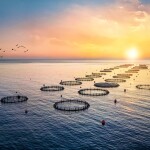In addition to battling suppressed international prices and irregular El Niño-driven weather conditions, Ecuador’s multi-billion-dollar shrimp sector is now facing three other obstacles: a proposed increase in taxes, higher logistics costs on the horizon, and sustained crime rates.
At the end of November, Ecuadorian President Daniel Noboa put a tax reform bill up for consideration to the country’s National Assembly. The Ecuadorian National Aquaculture Chamber (CNA) has questioned the bill, specifically article 13, which proposes that taxpayers make a monthly self-withholding prepayment of up to 3 percent of total income obtained.
If passed, the CNA warns it could “seriously reduce working capital and subtract liquidity from the entire shrimp sector’s value chain at a time when the sector is going through one of the worst economic crises of its history.”
“This monthly income withholding affects the money that businesses need to operate,” CNA President José Antonio Camposano said on X (formerly Twitter). “It is even more difficult when the proposed scheme does not take into account limits [on] the income tax already paid.”
“In 2024, a double whammy awaits us: paying the 2023 income tax and the monthly self-withholding [tax prepayment]. The problem is that this withholding would be calculated on an average basis, without taking into account the unique situation of each company,” he said in a series of posts.
Any overpaid amount would eventually be returned to the company, which “sounds good, but it actually complicates things more. While we wait for that, companies will still have to pay next year’s withholding each month,” Camposano said.
As part of Ecuador’s Corporation of Exporting Organizations (CORDEX), the CNA has already presented its arguments before Ecuador's Ministry of Production, Foreign Trade, Investment, and Fisheries, but the chamber said it also plans to schedule an audience with the National Assembly’s Economic Committee to outline reasons why the bill would damage the shrimp production chain.
The CNA noted Ecuador’s shrimp sector has accumulated losses of USD 1.4 billion (EUR 1.3 billion) to date this year due to the weakening of consumption rates in China and other key markets, generating unsustainable pressure up and down the production chain. The demand contraction has affected exports, while producers face competitive challenges due to rising operating costs, such as fuel prices, wages, and raw material costs.
Those costs are set to increase further with Danish shipping giant Maersk’s announcement of its plans to move its operations from the Port of Guayaquil – close to shrimp-farming operations – to a deepwater port in the town of Posorja, 90 kilometers away. The move, slated for the beginning of 2024, would cost shrimp farmers an extra USD 400 (EUR 366) per container, Camposano said. Besides the cost of transport itself, the container’s generator would need to run extra time to keep the cargo refrigerated, and security guards need to escort the cargo to protect from theft, he said.
That extra need for security guards epitomizes the growing insecurity currently rife throughout the ...
Photo courtesy of the Ecuadorian National Aquaculture Chamber








